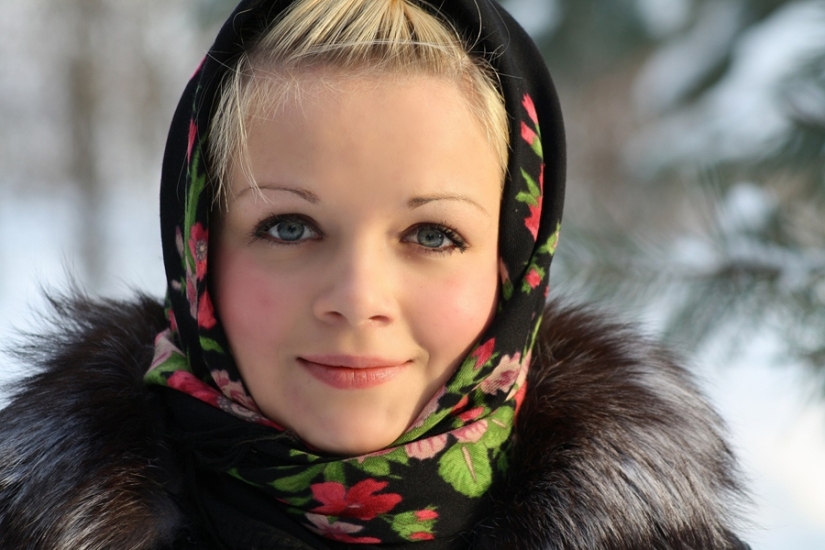Why don't the Russians smile?
Categories: Nations
By Pictolic https://pictolic.com/article/why-dont-the-russians-smile.htmlThe first thing that surprises a foreign tourist in Russia is the number of gloomy people. Why do Russians smile so little? And it is true: we smile much less than other nations of the West and East. The Hollywood smile is alien to the Russians, just like the unctuous expression on the face of the inhabitants of China or Vietnam.
Researchers of communicative behavior call natural unsmiling one of the most striking national-specific features of Russian communication. This feature of Russians is often perceived in the West as a result of poor upbringing or disrespect for the interlocutor.
However, this phenomenon has its own explanations, and they are not only in the harsh climate and difficult historical development of our country, but also in the fact that the Russian smile performs completely different functions than the foreign smile. Famous linguists I. A. Sternin and Yu. E. Prokhorov have identified several national features of the Russian smile in their study of communicative behavior.


Russians smile differently than other nations.
Russian Russian smile (normally) is performed only with the lips, occasionally the upper row of teeth becomes slightly visible; the demonstration of the upper and lower teeth when smiling, as the Americans do, is considered unpleasant, vulgar in Russian culture, and such a smile is called a grin or "horse". Russian Russian Russian writers have repeatedly drawn attention to the difference between Russian and American smiles, describing the American smile as strange and artificial for a Russian person. Maxim Gorky wrote that Americans have "teeth first of all" on their faces, and the Russian proverb says: "Rock-teeth are not luby". Our contemporaries did not avoid this question either: the satirist Mikhail Zhvanetsky wrote that Americans smile "as if they are included in the network".

A smile in Russian communication is not a signal of politeness.
For Americans and most Western Europeans, a smile is primarily a signal of politeness, so it is mandatory when greeting and during small talk. The more a person smiles when greeting, the more politeness to the interlocutor he demonstrates. In some Eastern cultures, a polite smile even has the purpose of making it easier for a person to perceive negative information. So, Ilya Ehrenburg in his memoirs tells about a Chinese man who with a smile told him about the death of his wife. That polite smile meant: "You must not be upset, this is my grief." In the Russians, this is simply unthinkable. A smile out of politeness is not typical for Russians, moreover, it is sometimes perceived as hostile. The Russian phrase "he smiled out of politeness" contains a disapproving attitude towards the smiling person. A polite smile for customers is also disapprovingly called "on duty" and is considered a manifestation of insincerity.

In Russian communication, it is not customary to smile at strangers.
A smile in Russian communication is most often addressed to friends. That is why saleswomen do not smile at customers — they do not know them. Russian Russian people, if a stranger smiled, it is likely to encourage the Russian to look for the reason for the smile addressed to him and will cause the question: "Do we know each other?" The smile is considered as an invitation to make contact, to talk. If the Russian is not ready for such a contact, he will not respond to a smile. In the case of a chance meeting with the eyes of the Americans smile, and the Russians, on the contrary, it is customary to look away.

It is not customary for Russians to smile when performing official duties, when performing any serious business.
This feature of the Russian smile is unique. Long ago, clerks, servants, and waiters were polite, but they never allowed themselves to smile. The good old tradition is still alive today. A friendly smile is hard to get used to in the field of Russian service, because to people of our mentality, such a "professional" smile seems like an artificial mask, a false disguise, behind which lies indifference. And while Japanese or American children are taught to smile from an early age as a kind of social duty, Russian parents often tell their children: "Don't smile! At school, be serious."

The Russian smile is designed to be only sincere and have a clear reason.
In Russian people, a smile is necessarily sincere, open and expresses a good mood of a person or sympathy for the interlocutor. Smiles that are not supported by a positive state of mind cause instant distrust and disapproval. "Sometimes a smile hides poison"," What is cooked in the heart, is not hidden in the face"," You can not delight the bitterness of the heart with a smile " — say Russian proverbs. The Chinese say otherwise: "My heart is hurt, but my face is smiling." Excessive smiling or cheerfulness seems suspicious. Such a smile can be seen as stupidity or, at worst, as a defiant behavior (for men) or an inviting sign (for women). That's why they say, " Laughing for no reason is a sign of foolishness."

The smile should be appropriate.
It is important for Russians that the smile is appropriate and appropriate to the situation. A Russian proverb says: business is time, fun is an hour. Teachers very often make comments to children: "Then you will smile, work." It is not customary to smile if there are people nearby who are known to have serious grievances: someone is ill, concerned about personal problems, etc. — "not up to smiles".

The deep causes of Russian unsmiling.
However, what are the roots of these features of the Russian smile? Researcher E. I. Volkova calls one of these reasons Russian Orthodoxy, which particularly reveres the patristic tradition-the works of the holy fathers of the first eight centuries of Christianity. The holy fathers warned that laughter is an instrument of the devil, who seduces people and then laughs at them. The church in the Middle Ages persecuted folk laughter culture, traveling actors and fairground buffoons.
"Blessed are those who weep, for they will be comforted," says the Gospel. Therefore, tears, not laughter, have become especially revered in the Orthodox tradition of spirituality. At the same time, not all tears evoked respect, but tearful crying about their sins and tears of compassion for their neighbor, the researcher notes.
Russian Russian lament is one of the main genres of Russian folklore and Russian literature. For example, the famous lament of Yaroslavna from "The Words about Igor's Regiment" or the image of a song-moan from a poem by N. A. Nekrasov ("This moan is called a song in our country").
Nikolai Berdyaev in his work "the Fate of Russia" sees the causes of the Russian unsmiling in the vast expanses of our country and the harsh climatic conditions of the life long struggle for survival, a special mental stock of the Russian people: "the Russian soul is depressed boundless Russian fields and vast Russian snows, it is dissolved in this immensity... And Russian almost completely unaware of the joy of forms. The Russian soul is bruised by the breadth, it sees no boundaries, and this boundlessness does not liberate, but enslaves it. And so the spiritual energy of the Russian man went inside, into contemplation, into soulfulness…»
Russian Russian linguists note that the majority of Russian people are cheerful, hospitable, cheerful and witty, despite the fact that a smile is not peculiar to Russians. A smile and a laugh are not the same thing, and, according to researchers, it is laughter that is inherent in Russia, although sometimes it is the same "laughter through tears" that Gogol wrote about.
Keywords: Russian Federation | Peoples | Smile | Russians
Post News ArticleRecent articles

Most of us loved as kids magic tricks, but someone loves them right now. However, the attitude to the hoax became a few others ...

Everything is changing. This is well and has long been known to everyone. But when something stays with you for a long time, it is ...
Related articles

Beloved by many, actor Mikhail Boyarsky has always been distinguished not only by his cheerful disposition and desperate, sometimes ...

Some celebrities are very different from the industry for his shyness and gloom. Large fees, international fame, parties, social ...

Anyone who has flown on airplanes knows that when boarding a flight, cute flight attendants are sure to greet passengers and send ...

Compared to the 1970-ies 1980‑e years were a time of cautious optimism in new York. Boom on wall street fueled the speculative ...